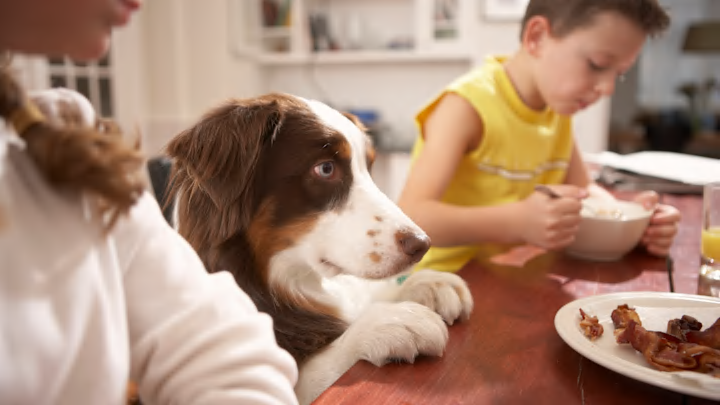Try as they might, most every pet owner will eventually succumb to the pathetic pleading of their puppy for some table scraps: steak, chicken, pizza. Conventional wisdom has long said that “human food” isn’t good for dogs, that they’re doing something wrong, and that the pet food industry has formulated canned goods or kibble that’s best for them.
But according to a new study, scraps might actually be better for their digestive health than a purely processed diet.
A paper recently published in Scientific Reports took a close look at the role of various dietary options in a dog’s digestive health—specifically, if a puppy’s menu had any influence on whether they would develop the digestive disorder known as chronic enteropathy later in life.
Researchers at the University of Helsinki in Finland examined data collected between 2009 and 2019 as part of a dog owner survey dubbed the DogRisk food frequency questionnaire. Over 7000 owners—and by extension, their dogs—participated in the poll, which collected data about a dog’s eating habits as well as their health.
Dogs that were reported to have eaten human food leftovers (defined as cooked meat, cooked rice, and cooked fish) in their first 18 months were 23 percent less like to develop enteropathy as adults. Similarly, dogs that ate a meat-based diet with vegetables (defined as raw meat, organs, fish, eggs, and tripe) were 22 percent less likely to suffer from digestive symptoms like vomiting or diarrhea.
Researchers also found an increased likelihood of gut problems when dogs were given rawhide, the chewy treats made from animal skins.
It’s important to note that although dogs with more leftovers and non-processed foods in their diet had fewer stomach troubles—possibly due to fewer carbohydrates—the study doesn't show a cause-and-effect relationship between the two: Pet owners should always follow their veterinarian’s guidance when it comes to diet and to avoid dishing out foods seasoned for human palates. (Garlic and onion are toxic to dogs; butters and other fats can cause stomach upset.) That said, it’s looking more like the occasional table treat isn’t so much a puppy cheat meal as a possible way of improving their gut health later on.
[h/t Smithsonian]
